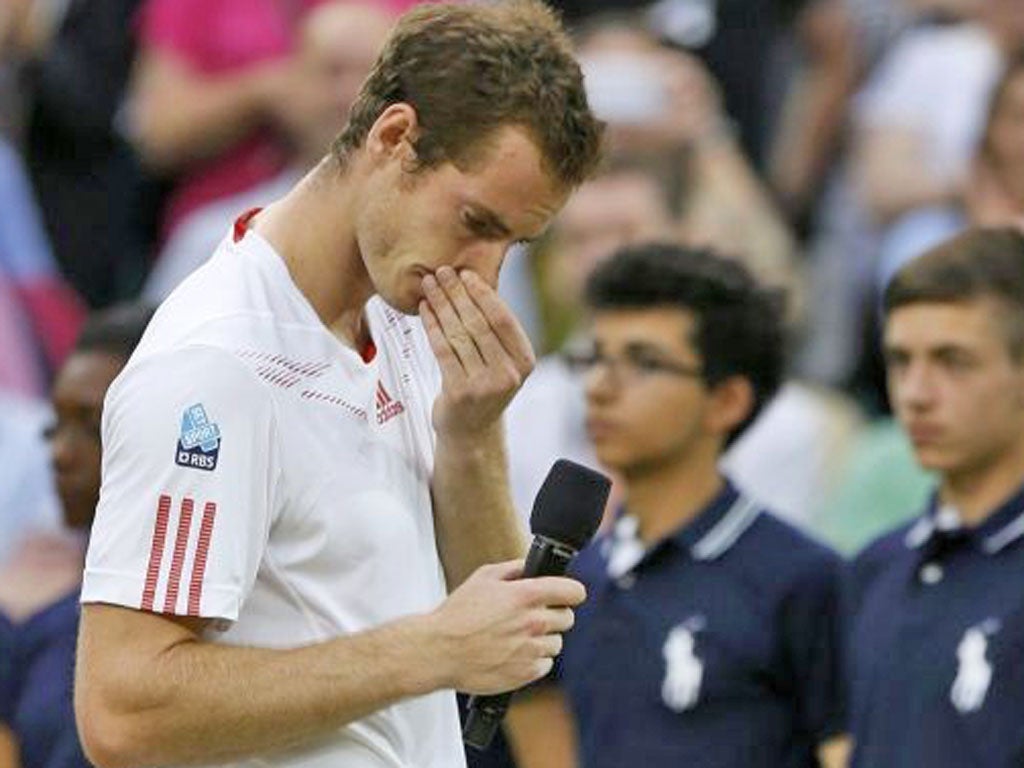Murray's tears of defeat showed this lump of granite has a heart

Your support helps us to tell the story
From reproductive rights to climate change to Big Tech, The Independent is on the ground when the story is developing. Whether it's investigating the financials of Elon Musk's pro-Trump PAC or producing our latest documentary, 'The A Word', which shines a light on the American women fighting for reproductive rights, we know how important it is to parse out the facts from the messaging.
At such a critical moment in US history, we need reporters on the ground. Your donation allows us to keep sending journalists to speak to both sides of the story.
The Independent is trusted by Americans across the entire political spectrum. And unlike many other quality news outlets, we choose not to lock Americans out of our reporting and analysis with paywalls. We believe quality journalism should be available to everyone, paid for by those who can afford it.
Your support makes all the difference.There's never been a post-match interview like it. Just before it, the Centre Court had watched with grudging sympathy as Andy Murray picked up his runner's-up prize. He held the plate aloft as if it were a silver "Thinks" balloon emblazoned with the word "LOSER". His face was a familiar picture of flared-nostril disgust and grumpy petulance, the visage of a lanky teenager whining, "It's not faaaiiiiiir".
A little over three minutes later he approached Sue Barker for the time-honoured interchange of banalities – and something extraordinary happened.
Instead of speaking, Murray held the microphone at thigh level, while his face, with eyes closed, searched the sky for inspiration. His head swung from side to side like Stevie Wonder singing "I Just Called to Say I Love You". The crowd looked on, nonplussed. Was he having a seizure?
Then the penny dropped. Murray was weeping. His first words into the microphone – "I'll try but it won't be easy" – came out all wobbly, his voice careering up and down the chromatic scale like a Swanee whistle.
His next words – "I'm getting closer" – drew applause for their acknowledgement that the road to being tennis's numero uno was a long, hard one. Andy the Dour was suddenly Zeno the Stoic. When he said he couldn't look at his Team Murray family, for fear of crying again, our hearts melted even further.
The former grumpy Scots git, the previous holder of the Most Peevish and Sulky (and Boring-Voiced) British Sportsman Alive Trophy, was transformed into a sensitive, charming youth weeping a pool of regret and shame, and asking his audience to understand how he felt.
"Tears, idle tears, I know not what they mean," wrote Tennyson. But we do, don't we? In a world of style projection and image management, they're the real thing.
Paul Gascoigne, previously taken for a rather thick and clownish fellow, became a hero during the 1990 World Cup when, on receiving a second yellow card and realising he was debarred – should England get past West Germany – from playing in the final, he burst into tears of sorrow. The team fool had turned into the "man of sentiment" – a figure from the late 18th century, when gentlemen routinely boasted about how copiously they'd wept during a play, a recital or a hanging.
Unexpected public weeping isn't solely restricted to our nation's sportsmen.
It also gets to politicians. Mrs Thatcher convinced the nation she possessed a heart of tungsten steel until the day in November 1990 when she left Downing Street with a lake of tears trembling in her hurt blue eyes. It was too late, unfortunately, to do her any good.
Hillary Clinton's tear ducts, by contrast, became so regularly choked up during speeches on the 2008 campaign trail when she was seeking the Democratic nomination that opponents accused her of "using tears as a campaign strategy".
Nor did tears work for our very own Ken Livingstone when, at his mayoral manifesto launch, he wept at the spectacle of "ordinary Londoners" saying how much they wanted him to be mayor – in words written by his staff.
Tears won't guarantee that the world will start to love you. The damning word "crocodile" lurks behind every public display of emotion. But sometimes they act as a revelation that a heart hitherto dismissed as pure Scottish granite has a melting point after all. You know what they say: in lacrimae veritas.
Join our commenting forum
Join thought-provoking conversations, follow other Independent readers and see their replies
Comments